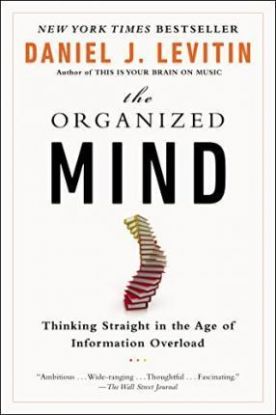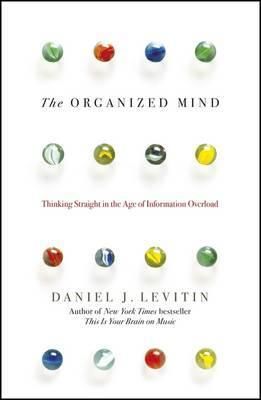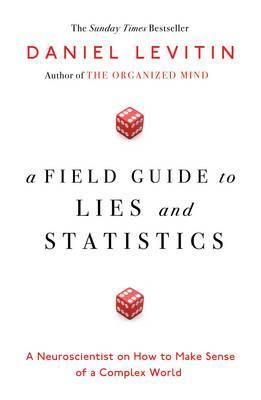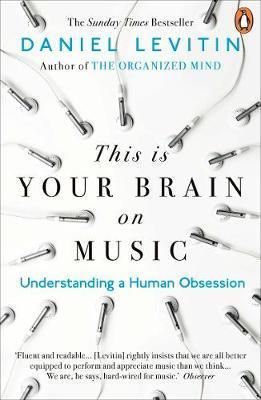Daniel Levitin
autor
Organized Mind
The Organized Mind: Thinking Straight in the Age of Information Overload
Vypredané
13,78 €
14,50 €
The Organized Mind
Author and neuroscientist Daniel Levitin tackles the problems of twenty-first century information overload in his New York Times and Sunday Times bestselling book The Organized Mind. "Thought-provoking and practical...Good advice based on sound neuroscientific principles." (Sunday Times). "Impressively wide-ranging and thoughtful. There are fascinating facts and examples throughout." (Wall Street Journal). "Deservedly a bestseller...Levitin demonstrates how easily we are bamboozled by statistical tricks, making his points with pithy stories." (Independent). "Levitin is about as knowledgeable a guide to neuroscience as one might hope for." (New York Times Book Review). "More insights per page than any other neuroscientist I know...smart, important, exquisitely written." (Daniel Gilbert, author of Stumbling on Happiness). "Sensible, practical advice...a comprehensive account of the way we think about organizing everything from our possessions to our friends." (Financial Times). Even the smartest mind can't beat the organized mind...In the digital age we are overwhelmed by information. Unable to make sense of it all, our creativity plummets, decision making suffers and we grow absent-minded. The twenty-first century sees us drowning under emails, forever juggling six tasks at once and trying to make complex decisions ever more quickly. This is information overload. In The Organized Mind, we learn how we got here and why smart organization improves our memories and attention - and makes us more imaginative and clear-sighted. Using a combination of academic research and examples from daily life, neuroscientist and bestselling author Daniel Levitin explains how to take back control of your life. You'll discover that: your brain has a daily processing limit - why waste it on cat photos? Pressing Send or clicking Like gives a dopamine hit - it's addictive - Daydreaming is your brain at its most productive - multitasking is a bad way to do nearly everything. This book will take you through every aspect of modern life, from healthcare to online dating to raising kids, showing that the secret to success is always organization. Levitin's ideas are surprising, powerful and will change the way you see the world. By following the advice in The Organized Mind, you'll function better, go further and find more time to do the things you actually want to do.
A Field Guide to Lies and Statistics
The bestselling author of The Organized Mind explains and debunks statistics in the information age We live in a world of information overload. Facts and figures on absolutely everything are at our fingertips, but are too often biased, distorted, or outright lies. From unemployment figures to voting polls, IQ tests to divorce rates, we're bombarded by seemingly plausible statistics on how people live and what they think. In a world where anyone can become an expert at the click of a button, being able to see through the tricks played with statistics is more necessary than ever before. Daniel Levitin teaches us how to effectively ask ourselves: can we really know that? And how do they know that? In this eye-opening, entertaining and accessible guide filled with fascinating examples and practical takeaways, acclaimed neuroscientist Daniel Levitin shows us how learning to understand statistics will enable you to make quicker, better-informed decisions to simplify your life.
Vypredané
15,19 €
15,99 €
A Field Guide to Lies
From The New York Times bestselling author of THE ORGANIZED MIND and THIS IS YOUR BRAIN ON MUSIC, a primer to the critical thinking that is more necessary now than ever. We are bombarded with more information each day than our brains can process—especially in election season. It's raining bad data, half-truths, and even outright lies. New York Times bestselling author Daniel J. Levitin shows how to recognize misleading announcements, statistics, graphs, and written reports revealing the ways lying weasels can use them. It's becoming harder to separate the wheat from the digital chaff. How do we distinguish misinformation, pseudo-facts, distortions, and outright lies from reliable information? Levitin groups his field guide into two categories—statistical infomation and faulty arguments—ultimately showing how science is the bedrock of critical thinking. Infoliteracy means understanding that there are hierarchies of source quality and bias that variously distort our information feeds via every media channel, including social media. We may expect newspapers, bloggers, the government, and Wikipedia to be factually and logically correct, but they so often aren't. We need to think critically about the words and numbers we encounter if we want to be successful at work, at play, and in making the most of our lives. This means checking the plausibility and reasoning—not passively accepting information, repeating it, and making decisions based on it. Readers learn to avoid the extremes of passive gullibility and cynical rejection. Levitin's charming, entertaining, accessible guide can help anyone wake up to a whole lot of things that aren't so. And catch some lying weasels in their tracks!
Vypredané
14,73 €
15,50 €
A Field Guide to Lies and Statistics
We live in a world of information overload. Facts and figures on absolutely everything are at our fingertips, but are too often biased, distorted, or outright lies. From unemployment figures to voting polls, IQ tests to divorce rates, we're bombarded by seemingly plausible statistics on how people live and what they think. Daniel Levitin teaches us how to effectively ask ourselves: can we really know that? And how do they know that?
In this eye-opening, accessible guide filled with fascinating examples and practical takeaways, acclaimed neuroscientist Daniel Levitin shows us how learning to understand statistics will enable you to make better, smarter judgements on the world around you.
Vypredané
12,30 €
12,95 €
The World in Six Songs
Dividing the sum total of human musical achievement, from Beethoven to The Beatles, Busta Rhymes to Bach, into just six fundamental forms, Levitin illuminates, through songs of friendship, joy, comfort, knowledge, religion and love, how music has been instrumental in the evolution of language, thought and culture. And how, far from being a bit of a song and dance, music is at the core of what it means to be human.
A one-time record producer, now a leading neuroscientist, Levitin has composed a catchy and startlingly ambitious narrative that weaves together Darwin and Dionne Warwick, memoir and biology, anthropology and a jukebox of anecdote to create nothing less than the ' soundtrack of civilisation' .
This is Your Brain on Music
The New York Times bestselling book which examines how humans experience music and unravels the mystery of our perennial love affair with it
Using musical examples from Bach to the Beatles, Levitin reveals the role of music in human evolution, shows how our musical preferences begin to form even before we are born and explains why music can offer such an emotional experience.
Music is an obsession at the heart of human nature, even more fundamental to our species than language. In This Is Your Brain On Music Levitin offers nothing less than a new way to understand it, and its role in human life.
Vypredané
11,88 €
12,50 €
The Changing Mind
We have long been encouraged to think of old age as synonymous with deterioration. Yet, recent studies show that our decision-making skills improve as we age and our happiness levels peak in our eighties.
What really happens to our brains as we get older?
More of us are living into our eighties than ever before. In The Changing Mind, neuroscientist, psychologist and internationally-bestselling author Daniel Levitin invites us to dramatically shift our understanding of growing older, demonstrating its many cognitive benefits. He draws on cutting-edge research to challenge common and flawed beliefs, including assumptions around memory loss and the focus on lifespan instead of 'healthspan'.
Levitin reveals the evolving power of the human brain from infancy to late adulthood.
Distilling the findings from over 4000 papers, he explains the importance of personality traits, lifestyle, memory and community on ageing, offering actionable tips that we can all start now, at any age.
Featuring compelling insights from individuals who have thrived far beyond the conventional age of retirement, this book offers realistic guidelines and practical cognition-enhancing tricks for everyone to follow during every decade of their life. This is a radical exploration of what we all can learn from those who age joyously.
Vypredané
18,00 €
18,95 €
Successful Aging
INSTANT TOP 10 BESTSELLER *New York Times *USAToday *Washington Post *LA Times
"Debunks the idea that aging inevitably brings infirmity and unhappiness and instead offers a trove of practical, evidence-based guidance for living longer and better."
—Daniel H. Pink, author of When and Drive
SUCCESSFUL AGING delivers powerful insights:
• Debunking the myth that memory always declines with age
• Confirming that "health span"—not "life span"—is what matters
• Proving that sixty-plus years is a unique and newly recognized developmental stage
• Recommending that people look forward to joy, as reminiscing doesn't promote health
Levitin looks at the science behind what we all can learn from those who age joyously, as well as how to adapt our culture to take full advantage of older people's wisdom and experience. Throughout his exploration of what aging really means, using research from developmental neuroscience and the psychology of individual differences, Levitin reveals resilience strategies and practical, cognitive enhancing tricks everyone should do as they age.
Successful Aging inspires a powerful new approach to how readers think about our final decades, and it will revolutionize the way we plan for old age as individuals, family members, and citizens within a society where the average life expectancy continues to rise.
Vypredané
18,00 €
18,95 €
The Changing Mind
We have long been encouraged to think of old age as synonymous with a decline in skills. Yet recent studies show that our decision making improves as we age, and our happiness levels peak in our eighties. What really happens to our brains as we get older?
In The Changing Mind, neuroscientist, psychologist and internationally bestselling author Daniel Levitin invites us to dramatically shift our understanding of aging, demonstrating its many cognitive benefits. He draws on cutting-edge research to offer realistic guidelines and practical cognition-enhancing tricks for everyone to follow during every decade of their life, and show us what we all can learn from those who age joyously.












